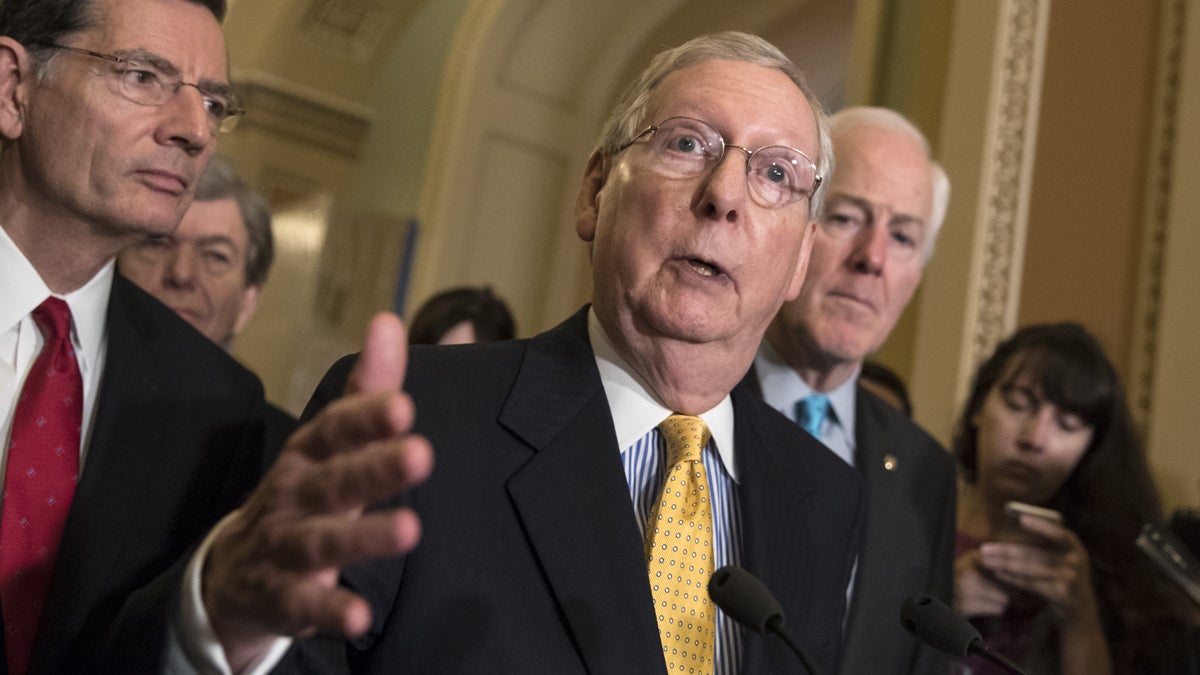Trumpcare in the dark: Secrecy is the new norm

Senate Majority Leader Mitch McConnell, R-Ky., flanked by Sen. John Barrasso, R-Wyo., left, and Majority Whip John Cornyn, R-Texas, meets with reporters at the Capitol in Washington, Tuesday, June 6, 2017. (AP Photo/J. Scott Applewhite)
Here’s what Senator Mitch McConnell said in 2010, when health care reform was taking shape: “Democrats on Capitol Hill are working behind the scenes on a plan aimed at jamming [Obamacare] through Congress against the clear wishes of an unsuspecting public.”
Here’s what his colleague John Cornyn said in 2010: “The people have a right to know what is happening behind closed doors with secret health care negotiations.”
The Republican mantra, back in the day, was that President Obama and his allies were ramming and jamming in secret — a blatant Orwellian lie, of course, because in reality the Obamacare legislative process took 15 months and featured dozens of public hearings, hundreds of roundtables with health and insurance experts, and a presidential summit with congressional leaders that was televised. It didn’t happen “behind the scenes.” It didn’t happen “behind closed doors.”
What’s happening now is behind closed doors. In Trumplandia, secrecy is the new normal.
The Senate Republicans who lied about secrecy seven years are now practicing it for real. Their speedy backstage maneuvers to kill Obamacare — and imperil coverage currently enjoyed by tens of millions of Americans — are reportedly nearing fruition, without a single public hearing. Thirteen GOP senators — all men, natch — have been deep-diving the details, and they’ve kept the lid on so tight that not even their Republican brethren have a clue what senatorial Trumpcare would do.
Heck, Orrin Hatch is on the backstage team, and even he doesn’t know. When a reporter told him recently that the public wants info about the bill, he replied, “Well, join the crowd. I’m in the same category.” Just yesterday, Charles Grassley said that “There isn’t a bill yet — nobody has seen any language.” Last week, Lisa Murkowski said, “None of us have actually seen language. Is it the framework of the House-passed bill and then we’re filling in our own details? I don’t know. We just don’t know.”
And yet, this Republican bill that would potentially reshape one-sixth of economy and wreak havoc with people’s lives — maybe it’s better than the draconian House Republican version, but maybe it’s worse — may well be rushed to a floor vote next week, before the July 4 recess. This would be courtesy of Mitch McConnell, the same guy who, in December 2009, assailed the president’s health reform as a “last-minute, closed-door” deal. Which is funny in retrospect, because the Senate OK’d Obamacare in 2010 after a floor debate that lasted 25 days.
We can only speculate why the current Senate Republicans are toiling in the dark — doing what they falsely accused Obama’s allies of doing — but the best guess is actually a no-brainer:
They’re afraid to go public, and take the heat, with a plan that will kill or weaken health coverage for millions of people. That’s a tough sell in a democracy. Hence their secrecy, an assault on democracy.
Obamacare is more popular in the polls than it has ever been (because beneficiaries realize what they may lose), the House GOP’s kill-Obamacare measure has been polling at roughly 20 percent approval (even Trump, who celebrated the House passage, now calls it “mean”), and the latest word, from The Wall Street Journal, is that Senate Republicans might slash Medicaid coverage to low-income and disabled Americans even more severely than the House Republicans did (a scenario that many Republican governors oppose, because they’d have to deal with the real-life consequences).
But we actually have no idea whether Senate Trumpcare would improve on House Trumpcare — according to the nonpartisan Congressional Budget Office, the latter would leave 23 million fewer people with health coverage by 2026, versus the terms of Obamacare — because it’s all being done in the dark. Even some Republicans confess to feeling uncomfortable; on CBS News the other day, Marco Rubio said: “The Senate is not a place where you can cook up something behind closed doors.”
Don’t assume, however, that senators like Rubio will stand up for transparency by taking down Trumpcare. When the chips are down and it’s time to vote, the grumblers will probably fall in line.
Even worse than the secrecy is the spinelessness. Senate Trumpcare (whatever it is) can be stopped if a mere three Republican senators vote nay and leave McConnell with only 49 yays. I would be shocked if that actually happened. Party discipline, fealty to the right-wing base, and the inexplicable desire to give an unpopular president some sort of win, trumps everything else. If a kill-Obamacare bill is ultimately signed, maybe Republicans pay a price in the ’18 midterms, and maybe not. But what we know for real is that a lot of lives will be hurt along the way.
No public hearings. It’s tragic that people may not learn what Republicans have in store for them until it’s too late. As one lawmaker once said, “This is a very important issue. You know, we shouldn’t try to do it in the dark. And whatever final bill is produced should be available to the American public and to the members of the Senate, certainly, for enough time to come to grips with it … We are going to insist — and the American people are going to insist — that it be done in a transparent, fair and open way.”
So said Mitch McConnell, in October ’09.
—
Follow me on Twitter, @dickpolman1, and on Facebook.
WHYY is your source for fact-based, in-depth journalism and information. As a nonprofit organization, we rely on financial support from readers like you. Please give today.

